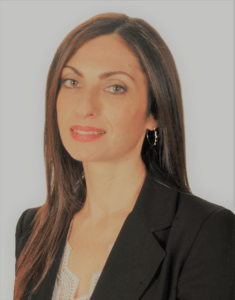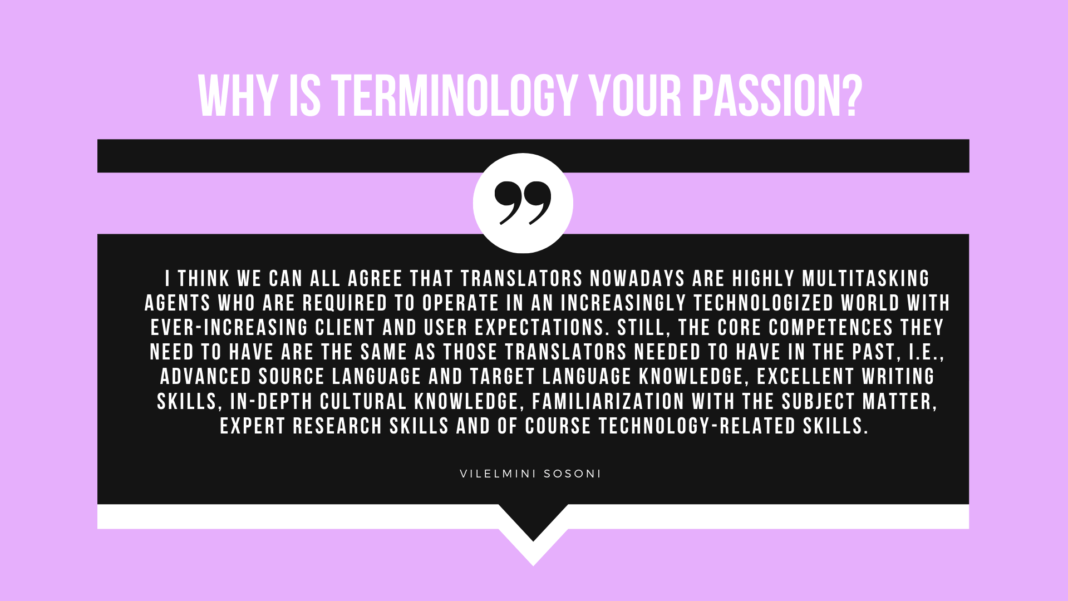
Dr Vilelmini Sosoni is tenured Assistant Professor in Translation at the Department of Foreign Languages, Translation and Interpreting at the Ionian University in Greece. She has taught Specialised Translation in the United Kingdom at the University of Surrey, the University of Westminster, Roehampton University and the University of Wolverhampton, and in Greece at the National and Kapodistrian University of Athens, Metropolitan College and the Institut Français d’ Athènes. She also has extensive professional experience having worked as a professional translator, editor and subtitler. She studied English Language and Literature at the National and Kapodistrian University of Athens and holds an MA in Translation and a PhD in Translation and Text Linguistics from the University of Surrey. Her research interests lie in the areas of the Translation of Institutional and Political Texts, Corpus Linguistics, Audiovisual Translation and Accessibility, as well as Machine Translation and Cognitive Science. She is, among others, a founding member of the Laboratory “Language and Politics” of the Ionian University and the Greek Chapter of Women in Localization and a member of the “Research Centre for Translation and Intercultural Studies” of the University of Roehampton. She is also a member of the Advisory Board and the Management Board of the European Master’s in Technology for Translation and Interpreting (EM TTI) funded by Erasmus+. She has participated in several EU-funded projects, notably Resonant, Trumpet, TraMOOC, Eurolect Observatory and Training Action for Legal Practitioners: Linguistic Skills and Translation in EU Competition Law, while she has edited several volumes and books on translation and published numerous articles in international journals and collective volumes. She has organized several international conferences in Translation and Technology and has delivered keynote and invited speeches at national and international events.
You hold a BA in English Language and Linguistics, a MA in Translation and a PhD in Translation and Text Linguistics. At what stage of your career did you first become interested in Terminology and why does terminology fascinate you?
During my postgraduate studies in Translation at the University of Surrey, I attended a Terminology class offered by Margaret Rogers, who would then become my PhD supervisor. It was then that I got immersed into the fascinating world of terms, terminology and terminography. Later, I had the chance to dwelve further into the study of primary and secondary term formation when in my doctoral research I studied EU terms, their origin and their renderings in the EU official languages, and I got to realise how demanding the work of terminologists really is, but also how crucial it is in inventing and establishing the linguistic clothing of concepts.
You are an assistant professor at the Department of Foreign Languages, Translation & Interpreting of the Ionian University, teaching terminology and translation. Could you please tell us more about the work you and your students are doing in the field of terminology?
I have been teaching Economic, Legal and Political Translation as well as EU Texts Translation at the Department of Foreign Languages, Translation and Interpreting for more than ten years. Naturally, a key element in my teaching is terminology. Institutional texts –as I collectively call all the texts we work on in my classes– are rich in terms which can be particularly challenging for students, as they refer to complex and very often culture-specific concepts that cannot be grasped without a solid knowledge of the domain in which they belong. We thus focus a lot on understanding the concepts behind the terms, the legal and administrative systems as well as the institutions of the countries the texts refer to. The rendering of the concepts in the target language is a different story. That’s when students get to realize that one-to-one equivalence is a delusion as is functional equivalence in many cases. They, thus, get familiarized with passing the message across through mainly descriptive paraphrases and loanwords. I have to say that I am always amazed at how hard it is for students to move away from this futile quest for one-to-one equivalence and aim for communicative equivalence instead.
You are a founding member of the Research Lab “Language and Politics” of the Ionian University. Could you explain us more about the objectives of the research lab and share the outcome of some of your projects so far?
The Research Lab “Language and Politics” of the Department of Foreign Languages, Translation and Interpreting was established in 2015 with a view to organizing activities and carrying out research projects in relation to the use of language as a means of political communication, as an instrument for exercising and for questioning power and as a means to shape but also question opinions and beliefs. The research undertaken in the Laboratory revolves around three axes: a) the use of language and all forms of verbal and non-verbal political communication (in the broadest sense of the term), b) language policies which may include education policies, policies on minority languages, language homogenisation, development of special jargons etc., c) the diachronic study of European and non-European languages as “vehicles” of cultural values and ideas. To date, the Lab has organized a series of lectures and talks by prominent Greek and foreign scholars on a variety of topics, ranging from the use of language as a means of exercising violence and the language of the Church to interpreting policies and the rights of minorities. Very recently it co-organised with the Department an online event in Translation and Interpreting in Crisis Settings. Finally, a milestone in the journey of the Lab, was the launching in 2018 of a Master’s Programme in “Politics, Language and Intercultural Communication” (POLICO).
Which do you believe are the most on-demand hard and soft skills a young translator/terminologist need to have nowadays? Give some tips as well for young professionals.
Oh, it really takes a lot to be a sought-after translator in the constantly evolving language services landscape, but at the same time there are abundant opportunities and many exciting options for young professionals! I think we can all agree that translators nowadays are highly multitasking agents who are required to operate in an increasingly technologized world with ever-increasing client and user expectations. Still, the core competences they need to have are the same as those translators needed to have in the past, i.e., advanced source language and target language knowledge, excellent writing skills, in-depth cultural knowledge, familiarization with the subject matter and expert research skills and of course technology-related skills. Use of CAT tools is no longer enough, as machine translation has been gaining ground following mind-blowing advances in AI and neural networks. Therefore, in my opinion, sound knowledge of machine translation technologies and especially machine translation evaluation is sine qua non. Translators should and can become a client’s best advisors as long as they keep abreast of technologies and know which tools to propose to their clients and the best ways to optimally integrate them in their workflow. Those key competences are necessarily complemented by soft skills or personal qualities. The main one is agility, adaptability! As change is never-ending, translators need to be able to change too. Integrity, reliability, professional pride, flexibility and team skills are second to none. So are empathy, enthusiasm and a positive attitude. Finally, since many translation professionals work as freelancers, marketing skills are also extremely important. My advice to all translators, newcomers to the profession as well as seasoned professionals, is to do their job with love and to look to the future without anchoring themselves to certainties. Positive change and success is in their hands!
What teaching methods do you use in your courses in order to make your students more familiar with legal and economic translation, along with EU text translation? How far do you use and teach IATE during your lectures?
When I teach translation of legal and economic texts, I start by familiarizing students with the political, legal and administrative systems and institutions of Greece, the UK and the US. I try to explain their differences and similarities and then I move to language and to the ways it reflects those differences and similarities. I do the same with EU texts translation, focusing on the history and institutions and then moving to the idiosyncrasies of EU texts, the need for sameness and surface similarity in EU legislative and judicial texts and the uniqueness of prescriptiveness in both source and target texts. As I said, I strive to move students away from this sterile quest for one-to-one equivalence and lead them to adopt a more communicative approach. Key to that is terminological research and that’s where IATE comes in! I explain to students the importance of using authoritative sources for solving terminological problems and challenges and I explain how they should use dictionaries, glossaries and parallel texts, but mainly the IATE database. IATE’s range of language combinations, its authoritativeness, its ease of access and usability and the breadth of the domains it covers render it the most valuable terminological resource for my students. Students are also trained in glossary and termbase creation. They start working on glossaries and termbases in the Translation modules, but they do more in the Translation Technology module where CAT tools are more vigorously used. I plan to further strengthen this systematic, process-driven approach to terminology teaching by introducing students to the principles of terminology earlier in the translation curriculum.
How is the current academic environment for terminologists in Greece? Are there any challenges? Do you see an advanced interest for the terminology field from your students?
My main concern is that Terminology is not seen as a separate field, but as a sub-field of Translation Studies. This deters students from realizing its potential, the breadth of applications it has and the related job prospects. As machine translation development and use go hand-in-hand with terminology, in my opinion, Terminology modules should be strengthened in both undergraduate and postgraduate programmes of study in Greece – following the model of the University of Luxembourg and its cooperation with the Terminology Coordination Unit of the European Parliament’s Directorate General for Translation.
Can you tell us more about your future academic aspirations and projects you will be working with?
I am currently finishing working with my colleagues Łucja Biel and Tomáš Svoboda on an edited volume dedicated to institutional translator training which will be published by Routledge in the coming months and also on finalizing a monograph about the translation of EU texts. In the coming months, I will be participating in the research project Resonant+ led by Charles University which focuses on the training of translators working in institutional settings. An area I have been very active recently is accessibility and I plan to work more on audio description for making content available/accessible to people with sensory disabilities.
The Ionian university has a long-term collaboration with TermCoord. In fact, you and your students participated in projects related to juridical and women’s rights terminology. Give us your view about the experience you and your team had with Terminology without Borders so far. Why is it important for universities and students to participate in this kind of initiatives?
The experience has been amazing. These collaborative projects where undergraduate and postgraduate students are introduced to the principles of Terminology and the ISO 704 and ISO 1087-2019 standards and then carry out actual terminological work are truly invaluable. Students learn to extract terminology from specialist corpora in a source language, they then seek equivalents in different target languages, while they also consult subject matter experts in cases where equivalents do not exist in a target language. What makes these projects really unique is that the students’ terms are validated by EU terminologists and then included in the IATE database. They are thus a perfect example of a value creating pedagogical model, i.e., a model whereby learning activities are combined with value creation activities. In other words, students not only apply theoretical knowledge in practice, but more importantly they apply their knowledge to create value for others, for millions of people who use IATE in their daily work! I am a fervent supporter of value creating pedagogy because I believe in what Lackéus [1] calls the “altruistic paradox”: humans get more motivated by creating value for others in 10 minutes than by creating value for themselves in 10 years. The feedback I have been getting from students is a further indicator of the value of these projects and I am looking forward to working with the TermCoord for many years to come!
[1] Lackéus, M. 2013. Developing Entrepreneurial Competencies – An Action-Based Approach and Classification in Education. PhD dissertation. Gothenburg: Chalmers University of Technology.

Interviewed by Ioanna Mavridou
Ioanna holds a Bachelor’s degree in Translation from the Ionian University in Corfu and has also studied her Master’s in Communication at Gothenburg University in Sweden. A digital communications enthusiast, she has completed a professional Social Media & Digital Marketing certification. She speaks Greek, English, Swedish, German and Russian. She is a Communications Trainee at the Terminology Coordination Unit of the European Parliament.

